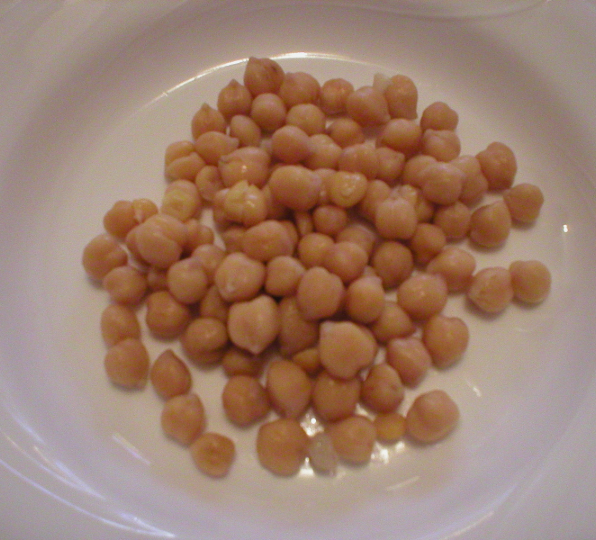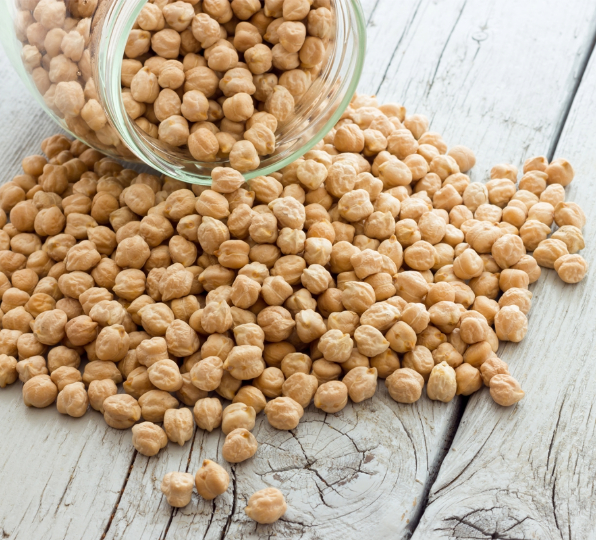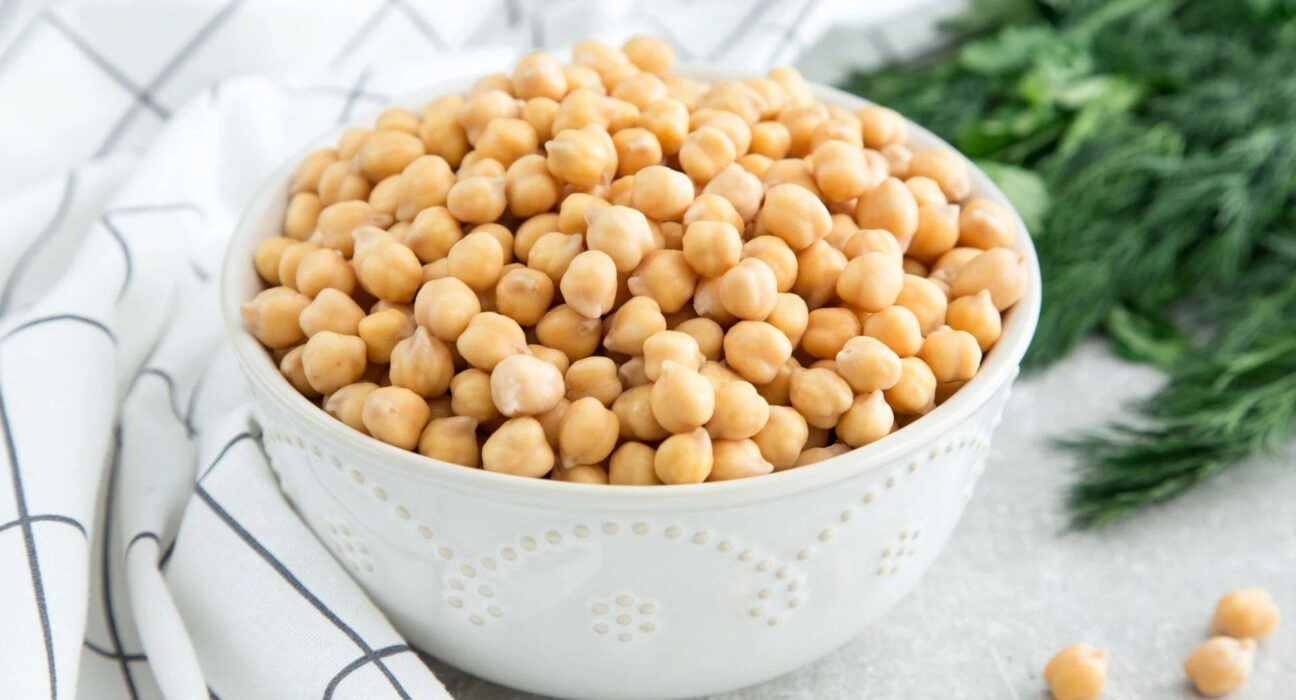Introduction:
Garbanzo beans, sometimes referred to as chickpeas, are a multipurpose legume that have been prized for centuries in culinary traditions all over the world. Beyond just being incredibly tasty and having a creamy texture, chickpeas are nutrient-dense and have a long list of health advantages that have been proven by science. Come learn about the amazing range of health benefits that chickpeas offer, from heart health promotion to weight management assistance, and see why this underappreciated legume should be a part of your diet.
1. Rich in Plant-Based Protein
Chickpeas, also known as garbanzo beans, are celebrated for their exceptional nutritional profile, particularly their high content of plant-based protein. These versatile legumes serve as a cornerstone of many cuisines worldwide and are revered for their ability to provide a rich source of protein, making them an ideal choice for vegetarians, vegans, and individuals seeking to reduce their meat consumption.
One of the primary attributes of chickpeas is their impressive protein content. As a plant-based protein source, chickpeas offer an abundance of essential amino acids, the building blocks of protein that are crucial for building and repairing tissues, supporting muscle growth, and maintaining overall health. Incorporating chickpeas into meals provides a convenient and nutritious way to meet daily protein needs without relying on animal products.
Moreover, chickpeas are rich in fiber, vitamins, and minerals, further enhancing their nutritional value. The combination of protein and fiber in chickpeas not only promotes feelings of fullness and satiety but also supports digestive health by promoting regular bowel movements and nourishing beneficial gut bacteria. Additionally, chickpeas are a good source of folate, iron, magnesium, and zinc, as well as vitamins B6 and K, which play vital roles in energy metabolism, red blood cell production, and immune function.
Furthermore, chickpeas offer several health benefits beyond their protein content. They have been associated with improved heart health due to their high fiber and low glycemic index, which help lower cholesterol levels, regulate blood sugar levels, and reduce the risk of cardiovascular disease. Additionally, chickpeas contain antioxidants and anti-inflammatory compounds that contribute to overall well-being and may help protect against chronic diseases.
Incorporating chickpeas into your diet offers a versatile and delicious way to boost protein intake and support overall health. Whether enjoyed in salads, soups, stews, curries, or as a crunchy snack when roasted, chickpeas provide a satisfying and nutritious option for nourishing your body with essential nutrients.
2. Heart Health
Chickpeas, beyond their versatility and delicious taste, have been recognized as a heart-healthy food, with studies indicating several mechanisms through which they contribute to cardiovascular well-being. The inclusion of chickpeas in one’s diet has shown promising results in improving heart health by positively influencing cholesterol levels, triglycerides, and overall cardiovascular function.
One notable aspect of chickpeas that contributes to heart health is their impact on cholesterol levels. Research has demonstrated that regular consumption of chickpeas may lead to a reduction in levels of LDL (low-density lipoprotein) cholesterol, commonly referred to as the “bad” cholesterol. Elevated LDL cholesterol is a significant risk factor for cardiovascular diseases. Additionally, chickpeas have been associated with an increase in levels of HDL (high-density lipoprotein) cholesterol, often considered the “good” cholesterol. HDL cholesterol helps transport LDL cholesterol away from the arteries, reducing the risk of plaque buildup and improving overall heart health.
Triglyceride levels, another crucial marker of cardiovascular health, may also benefit from the consumption of chickpeas. Studies suggest that incorporating chickpeas into the diet may contribute to a reduction in triglyceride levels. Elevated triglycerides are associated with an increased risk of heart disease, making the management of these lipid levels vital for cardiovascular well-being.
The heart-protective effects of chickpeas are attributed to several factors. The fiber content in chickpeas plays a pivotal role in managing cholesterol levels by binding to cholesterol in the digestive system and aiding its elimination from the body. Additionally, the presence of potassium in chickpeas contributes to maintaining healthy blood pressure levels, reducing strain on the cardiovascular system.
3. Blood Sugar Control
Chickpeas, with their remarkable nutritional profile, emerge as a beneficial food choice for individuals seeking to manage blood sugar levels effectively. Notably, chickpeas possess a low glycemic index (GI), a key factor in maintaining stable blood sugar levels and managing diabetes. This characteristic makes chickpeas an excellent option for individuals with diabetes or those aiming to regulate blood sugar levels as part of a balanced diet.
The glycemic index is a measure that ranks foods based on how quickly they raise blood sugar levels after consumption. Foods with a low glycemic index cause a gradual and steady increase in blood sugar levels, while those with a high glycemic index lead to rapid spikes followed by a sharp drop in blood sugar levels. Chickpeas, with their low GI rating, provide a sustained release of glucose into the bloodstream, promoting more stable blood sugar levels over time.
This gradual and steady increase in blood sugar levels after consuming chickpeas offers several benefits for individuals with diabetes. It helps prevent sudden spikes in blood sugar, reducing the risk of hyperglycemia and the need for excessive insulin secretion to manage glucose levels. Additionally, the sustained energy provided by chickpeas can help individuals maintain consistent energy levels throughout the day, avoiding the energy crashes often associated with blood sugar fluctuations.
Moreover, the fiber content in chickpeas further contributes to blood sugar control. Fiber slows down the digestion and absorption of carbohydrates, preventing rapid spikes in blood sugar levels. Additionally, fiber promotes feelings of fullness and satiety, which can help individuals manage their weight and reduce the risk of insulin resistance, a hallmark of type 2 diabetes.
4. Digestive Health
Chickpeas, renowned for their nutritional prowess, are not only a versatile culinary ingredient but also a boon for digestive health. Their abundant fiber content plays a pivotal role in promoting digestive well-being by facilitating regular bowel movements, preventing constipation, and nurturing a flourishing community of beneficial gut bacteria. Additionally, chickpeas offer potential protective effects against digestive disorders, including colon cancer, making them a valuable addition to a gut-friendly diet.
The fiber-rich nature of chickpeas makes them an excellent ally in promoting regularity and preventing constipation. Dietary fiber adds bulk to stool, softening it and promoting its smooth passage through the digestive tract. By facilitating efficient bowel movements, chickpeas help alleviate discomfort associated with constipation and support overall digestive comfort.
Moreover, chickpeas contribute to the maintenance of a healthy gut microbiome, the diverse community of microorganisms residing in the gastrointestinal tract. The soluble fiber found in chickpeas serves as a prebiotic, a type of fiber that serves as fuel for beneficial gut bacteria. These bacteria ferment soluble fiber, producing short-chain fatty acids that nourish the cells lining the colon and contribute to a healthy gut environment.
Furthermore, the fiber-rich diet provided by chickpeas may confer protection against colon cancer and other digestive disorders. Studies have suggested that a high-fiber diet, such as one rich in chickpeas, is associated with a reduced risk of colorectal cancer. Fiber helps keep the digestive system moving efficiently, reducing the time that potentially harmful substances spend in contact with the colon lining and minimizing the risk of cellular damage and inflammation.
Incorporating chickpeas into the diet offers a delicious and nutritious way to support digestive health and overall well-being. Whether enjoyed in salads, soups, stews, or as a snack when roasted, chickpeas provide a versatile and satisfying option for promoting gastrointestinal comfort and vitality.
5. Weight Management
Chickpeas, revered for their nutritional density and versatility, emerge as a formidable ally in the quest for weight management. Their unique combination of fiber and protein makes them a satisfying and nourishing addition to any diet, offering multiple mechanisms to support weight loss or weight management efforts.
The fiber content in chickpeas plays a crucial role in promoting feelings of fullness and satiety. Dietary fiber adds bulk to meals, slowing down the emptying of the stomach and prolonging the sensation of fullness after eating. By creating a sense of satisfaction and reducing the urge to eat more, chickpeas help curb appetite and prevent overeating, contributing to a reduction in calorie intake.
Moreover, the protein content in chickpeas further enhances their satiating properties. Protein is known to be the most filling macronutrient, as it requires more time and energy to digest compared to carbohydrates or fats. By including chickpeas, a rich source of plant-based protein, in meals, individuals can increase their overall protein intake and promote greater feelings of fullness, leading to reduced hunger and fewer cravings throughout the day.
Additionally, chickpeas offer a low-energy-density food option, meaning they provide a substantial volume of food for relatively few calories. This makes chickpeas a satisfying choice for those looking to manage their weight without sacrificing portion size or feeling deprived. By incorporating chickpeas into meals, individuals can enjoy hearty and satisfying dishes while still adhering to their calorie goals.
Furthermore, the nutrient-rich profile of chickpeas, including vitamins, minerals, and antioxidants, supports overall health and vitality during weight management efforts. By choosing nutrient-dense foods like chickpeas, individuals can ensure they meet their nutritional needs while pursuing their weight loss or weight management goals.
Incorporating chickpeas into the diet offers a delicious and nutritious way to support weight management. Whether enjoyed in salads, soups, stews, or as a crunchy snack when roasted, chickpeas provide a versatile and satisfying option for those seeking to curb appetite, reduce calorie intake, and achieve their weight-related objectives.
6. Bone Health
Chickpeas, esteemed for their versatility and nutritional value, extend their benefits beyond mere sustenance to support bone health. Laden with a wealth of bone-building nutrients such as calcium, magnesium, phosphorus, and vitamin K, chickpeas emerge as a valuable dietary component in promoting strong and resilient bones. Regular inclusion of chickpeas in the diet may aid in reducing the risk of osteoporosis and fractures, safeguarding skeletal integrity and overall bone health.
Calcium, an essential mineral for bone health, is abundant in chickpeas, albeit in smaller quantities compared to dairy products. Nonetheless, the calcium content in chickpeas contributes to the maintenance of bone density and strength, playing a vital role in preventing osteoporosis, a condition characterized by weakened and brittle bones prone to fractures.
Furthermore, chickpeas boast a noteworthy content of magnesium and phosphorus, two minerals intricately involved in bone metabolism and structure. Magnesium is essential for the absorption and utilization of calcium in the bones, while phosphorus contributes to the formation of bone tissue and the maintenance of bone mineral density. Together, these minerals work synergistically with calcium to fortify bones and support overall skeletal health.
Moreover, chickpeas are a rich source of vitamin K, a fat-soluble vitamin known for its role in bone mineralization and blood clotting. Vitamin K aids in the deposition of calcium into the bone matrix, enhancing bone density and reducing the risk of fractures. By ensuring an adequate intake of vitamin K through foods like chickpeas, individuals can support optimal bone health and resilience.
7. Anti-inflammatory Properties
Chickpeas, celebrated for their versatility and nutritional density, possess a remarkable array of health-promoting properties, including potent anti-inflammatory effects. Packed with antioxidants and anti-inflammatory compounds such as polyphenols and saponins, chickpeas offer valuable support in combating chronic inflammation, a pervasive underlying factor in various health conditions, including heart disease, diabetes, and cancer.
Polyphenols, abundant in chickpeas, are a diverse group of phytochemicals with potent antioxidant and anti-inflammatory properties. These compounds scavenge harmful free radicals in the body, neutralizing oxidative stress and reducing inflammation. By mitigating the inflammatory response, polyphenols help protect cells and tissues from damage and contribute to overall health and well-being.
Additionally, chickpeas contain saponins, bioactive compounds known for their anti-inflammatory effects. Saponins exert their anti-inflammatory actions by modulating immune responses and reducing the production of pro-inflammatory molecules. By inhibiting inflammatory pathways, saponins help alleviate inflammation and promote a balanced immune system.
Furthermore, chickpeas offer a rich source of other antioxidants, including flavonoids and carotenoids, which contribute to their anti-inflammatory properties. These antioxidants work synergistically to combat oxidative stress and inflammation, helping to maintain cellular health and reduce the risk of chronic diseases associated with inflammation.
Chronic inflammation is implicated in the development and progression of various health conditions, including cardiovascular diseases, metabolic disorders, and certain cancers. By incorporating chickpeas into the diet, individuals can harness the potent anti-inflammatory effects of these legumes to support overall health and reduce the risk of inflammatory-related ailments.
8. Improved Gut Health
Chickpeas, revered for their nutritional density and culinary versatility, play a pivotal role in fostering improved gut health, thanks to their rich content of fiber and resistant starch. These components act as prebiotics, nourishing beneficial gut bacteria and promoting a harmonious and thriving gut microbiome. A balanced gut microbiome is instrumental in supporting digestive health, bolstering immune function, and enhancing overall well-being.
The fiber content in chickpeas serves as a vital substrate for the gut microbiota, the diverse community of microorganisms inhabiting the gastrointestinal tract. As a prebiotic, dietary fiber provides fuel for beneficial bacteria in the colon, stimulating their growth and activity. By fermenting dietary fiber, gut bacteria produce short-chain fatty acids (SCFAs), such as acetate, propionate, and butyrate, which play essential roles in gut health. SCFAs contribute to the maintenance of intestinal barrier integrity, regulate immune responses, and exert anti-inflammatory effects, promoting a healthy gut environment.
Additionally, chickpeas contain resistant starch, a type of carbohydrate that resists digestion in the small intestine and reaches the colon intact. Once in the colon, resistant starch serves as a substrate for fermentation by gut bacteria, leading to the production of SCFAs and other beneficial metabolites. This fermentation process contributes to the proliferation of beneficial bacteria while inhibiting the growth of harmful pathogens, fostering a balanced and resilient gut microbiome.
A balanced gut microbiome is crucial for digestive health, as it supports optimal nutrient absorption, regulates bowel movements, and helps prevent gastrointestinal disorders such as irritable bowel syndrome (IBS) and inflammatory bowel disease (IBD). Furthermore, the gut microbiome plays a pivotal role in immune function, influencing the development and activity of immune cells and helping protect against infections and inflammatory conditions.
Incorporating chickpeas into the diet offers a delicious and nutritious way to support gut health and promote a balanced microbiome. Whether enjoyed in salads, soups, stews, or as a crunchy snack when roasted, chickpeas provide a versatile and satisfying option for nourishing the gut microbiota and enhancing overall well-being.
9. Brain Health
Chickpeas, renowned for their versatility and nutritional density, offer a wealth of benefits for brain health, thanks to their abundance of essential nutrients such as folate, magnesium, and vitamin B6. These vital nutrients play pivotal roles in neurotransmitter synthesis, cognitive function, and mood regulation, thereby potentially reducing the risk of depression and cognitive decline while supporting overall brain health and vitality.
Folate, a B vitamin abundant in chickpeas, plays a crucial role in brain health by contributing to neurotransmitter synthesis and methylation processes. Neurotransmitters, such as serotonin, dopamine, and norepinephrine, are chemical messengers that regulate mood, cognition, and behavior. Folate is involved in the synthesis of these neurotransmitters, facilitating optimal brain function and emotional well-being. Adequate folate intake has been linked to a reduced risk of depression and cognitive decline, making it a vital nutrient for maintaining brain health throughout life.
Magnesium, another essential nutrient found in chickpeas, is involved in over 300 biochemical reactions in the body, including those crucial for brain function. Magnesium plays a role in neurotransmitter release and synaptic plasticity, processes that are fundamental to learning, memory, and cognitive function. Additionally, magnesium exhibits neuroprotective effects, potentially reducing the risk of neurodegenerative diseases such as Alzheimer’s disease and Parkinson’s disease. Adequate magnesium intake has also been associated with improved mood and reduced symptoms of depression and anxiety.
10. Antioxidant Protection
Chickpeas, renowned for their versatility and nutritional density, boast an impressive array of antioxidants that confer powerful protection against oxidative stress. These antioxidants, including flavonoids, phenolic acids, and carotenoids, play a pivotal role in neutralizing harmful free radicals in the body, mitigating oxidative damage, and reducing the risk of chronic diseases.
Flavonoids, abundant in chickpeas, are a diverse group of phytochemicals with potent antioxidant properties. These compounds scavenge free radicals, unstable molecules that can damage cells and contribute to various health issues, including inflammation, cardiovascular diseases, and cancer. By neutralizing free radicals, flavonoids help protect cells from oxidative damage, supporting overall health and well-being.
Phenolic acids, another class of antioxidants found in chickpeas, contribute to their protective effects against oxidative stress. These compounds exhibit antioxidant, anti-inflammatory, and antimicrobial properties, offering multifaceted benefits for health. Phenolic acids help prevent oxidative damage to cellular components, including DNA, proteins, and lipids, thereby reducing the risk of chronic diseases associated with oxidative stress.
Additionally, chickpeas contain carotenoids, pigments responsible for their vibrant colors, which also serve as antioxidants. Carotenoids, such as beta-carotene and lutein, play essential roles in protecting cells from oxidative damage and supporting eye health. These antioxidants help maintain the integrity of cell membranes, regulate immune responses, and contribute to overall well-being.
The antioxidant-rich nature of chickpeas makes them a valuable dietary component in promoting health and reducing the risk of chronic diseases. By incorporating chickpeas into the diet, individuals can harness the potent antioxidant properties of these legumes to support cellular health, combat oxidative stress, and promote longevity


Conclusion:
From promoting heart health and blood sugar control to supporting digestive health and weight management, chickpeas offer a wealth of science-backed benefits that make them a valuable addition to any diet. Whether enjoyed in salads, soups, stews, or hummus, incorporating chickpeas into your meals allows you to reap the many rewards they have to offer for your health and well-being. So, embrace the mighty chickpea and discover how this nutritious legume can nourish your body and enrich your life.












